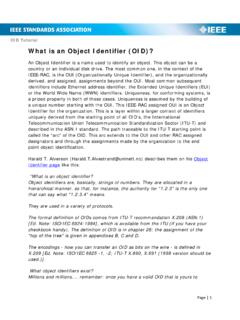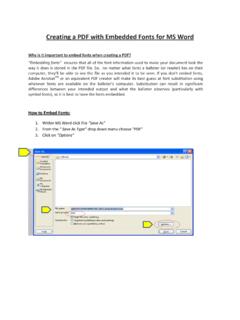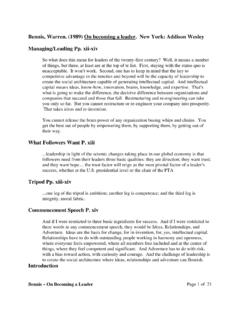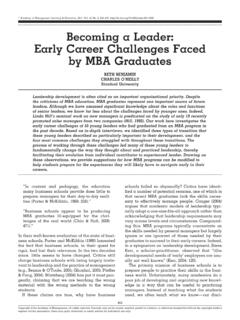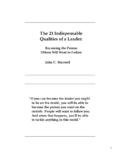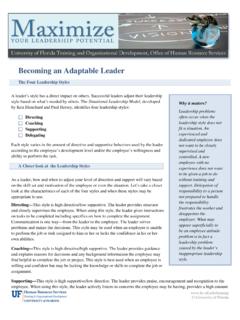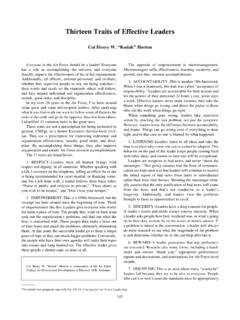Transcription of The IEEE Global Initiative for Ethical Considerations in ...
1 1 5 June 2017 The IEEE Global Initiative for Ethical Considerations in Artificial Intelligence and Autonomous Systems becoming a Leader in Global Ethics Creating a Collaborative, Inclusive Path for Establishing Ethical Principles for Artificial Intelligence and Autonomous Systems By Sara R. Mattingly-Jordan Organizations aspiring to such a grand mission as creating Global standards for artificial intelligence and autonomous systems must accept that standards development is a provisional, deliberative, exercise that must be infused with the spirit of generosity, curiosity, critique, and collaboration. Between January and May 2017, leadership of The IEEE Global Initiative for Ethical Considerations in Artificial Intelligence and Autonomous Systems welcomed input from around the globe on their founding document Ethically Aligned Design: A Vision for Prioritizing Human Wellbeing with Artificial Intelligence and Autonomous Systems (AI/AS) (hereafter referred to as EAD or EADv1).
2 Broken into multiple sections, EADv1 features over eighty Issues and Candidate Recommendations designed to provide academics, technologists and policy makers with specific, directional principles to help prioritize Ethical Considerations at the forefront of AI/AS design. The document also serves as impetus for Committees of The IEEE Global Initiative to submit Standards ideas to the IEEE Standards Association based on their efforts. In this way Ethically Aligned Design is helping to both frame key Global principles and build pragmatic soft governance that can deeply and positively influence the AI/AS landscape. Instead of approaching the process of iterating EAD through a lens of technocratic expertise alone, The IEEE Global Initiative offered their ambitious work for Global , multidisciplinary review.
3 Infused with a spirit of provisionalism and democracy, The IEEE Global Initiative threw open all elements of the document from principle selection to grammatical inflection to conscientious revisions by any and all interested parties. Within this five-month period, the authors of Ethically Aligned Design received comments from over 35 individuals or organizations, from 10 nations, who volunteered their time and knowledge to advance the cause of improving the Ethically Aligned Design version 1 document. These individuals offered comments and resources to build a more well-rounded and Global vision for The IEEE Global Initiative . Whether through imparting their disciplinary, national, or Ethical perspectives to the committee, these commentators submitted over 65,000 words of feedback, including providing over ninety references for further examination by the committees of The IEEE Global Initiative .
4 The IEEE Global Initiative for Ethical Considerations in Artificial Intelligence and Autonomous Systems 2 5 June 2017 The IEEE Global Initiative for Ethical Considerations in Artificial Intelligence and Autonomous Systems As a summary and response to the feedback could not do each individual s contribution full justice, you may read all comments here. As we discuss below, based upon feedback from the contributors, subsequent versions of EAD will work to embrace Global ethics through more developed attention to polylingual, collaborative, interdisciplinary, and non-Western principled approaches. Polylingual Inclusion In which natural language will an artificial intelligence think?
5 Should a Global organization like IEEE draft principles leading to standards in the idiom in which artificial intelligence will think? Producing Global document invariably requires that the drafting committee make a choice of language for the production of the draft. EAD reviewers from European nations brought to our attention the limits of relying on English-language resources for discussions of key Ethical principles. They advocated, instead, a clearer explanation of the resources used, particularly those in non-English journals, and requested that attention to other languages be given in the construction of a polylingual glossary of key terms.
6 The basis for recommendations of a polylingual perspective for the building blocks of subsequent versions of EAD is social constructivist in nature. The respondents made their case in two ways. The first is that inclusion of different languages into the intellectual background of the drafting discussions will invite inclusion of alternative constructions of Ethical norms and social reality. Within the comparative humanities and social sciences disciplines, it is convention that full comprehension of cultures requires comprehension of its symbolic system, including its language. The gracious reviewers who pointed out that resources in other languages should be incorporated into the intellectual background of the EAD project gently prodded the drafting committee to consider these conventions in their endeavors.
7 (Others were more direct to point out that additional expertise from humanities and social sciences experts should be incorporated for this reason and others.) The second way in which this case was made is that inclusion of polylingual resources into developmental discussions will, by proxy, include the communities speaking various languages into a setting discussing the setting of potential standards. Inclusion of communities not obviously represented in the list of existing 3 5 June 2017 The IEEE Global Initiative for Ethical Considerations in Artificial Intelligence and Autonomous Systems Committees is a point taken up next. Collaborative Inclusion Who will craft the Ethical principles and make recommendations for standards that are imparted into artificial intelligence systems?
8 While some reviewers pointed out a diffuse concern for representativeness of the drafting committees, reviewers from East Asia brought to the table two perspectives that broaden the base of participation in for The IEEE Global Initiative : 1) organizational collaboration and 2) integrative pedagogy. IEEE and other organizations with interests in the AI/AS arenas are globally connected through chapters and affiliation networks of related professionals. As pointed out chiefly by our Asian collaborators, many members of Global chapters are eager to impart technical and Ethical knowledge to the EAD authors. However, an existing barrier to inclusion is translation of key documents into Asian languages, specifically Chinese and Japanese.
9 Through the collaborative partnerships with IEEE chapters, many members are offering to organize translation projects and to coordinate dissemination of those efforts. (To date, the Asian members of The IEEE Global Initiative have translated the Executive Summary of EADv1 into Chinese, Japanese and Korean, and a Portuguese version is also being discussed). Many reviewers enthusiastically endorsed the use of the EAD document as a tool for engagement of students in the development of student s beliefs about ethics in AI/AS. Reviewers from the Asia-Pacific region endorsed the use of the EAD documents, whether the full version or overview versions in their undergraduate and graduate courses.
10 Some particularly engaged reviewers enumerated the links between extant resources for teaching topics identified within the EAD document. Adoption of EAD into an interdisciplinary classroom was also a feature of Latin American feedback. Interdisciplinary Inclusion Perceptions of the design of artificial intelligence as being a matter reserved for only experts in the computer sciences, electrical engineering disciplines, and ethicists of science and technology were directly challenged by our reviewers. Reviewers from Latin America, specifically Mexico and Brazil, expanded the disciplinary horizons of The IEEE Global Initiative by bringing important variations on these disciplines to the table.






